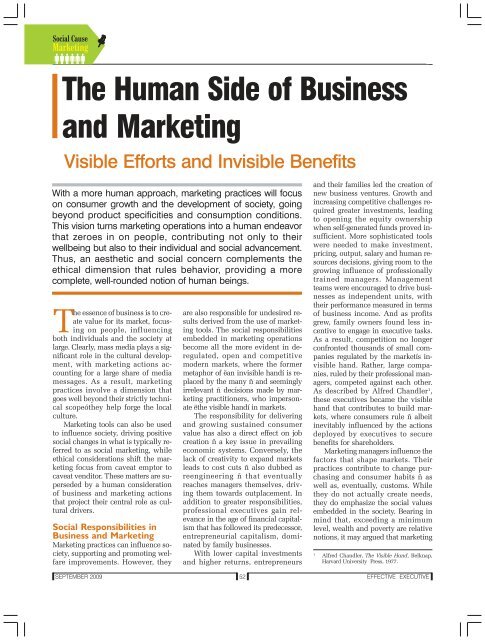Social Cause Marketing - The Regis Group Inc
Social Cause Marketing - The Regis Group Inc
Social Cause Marketing - The Regis Group Inc
You also want an ePaper? Increase the reach of your titles
YUMPU automatically turns print PDFs into web optimized ePapers that Google loves.
<strong>The</strong> Human Side of Business<br />
and <strong>Marketing</strong><br />
Visible Efforts and Invisible Benefits<br />
With a more human approach, marketing practices will focus<br />
on consumer growth and the development of society, going<br />
beyond product specificities and consumption conditions.<br />
This vision turns marketing operations into a human endeavor<br />
that zeroes in on people, contributing not only to their<br />
wellbeing but also to their individual and social advancement.<br />
Thus, an aesthetic and social concern complements the<br />
ethical dimension that rules behavior, providing a more<br />
complete, well-rounded notion of human beings.<br />
<strong>The</strong> essence of business is to create<br />
value for its market, focusing<br />
on people, influencing<br />
both individuals and the society at<br />
large. Clearly, mass media plays a significant<br />
role in the cultural development,<br />
with marketing actions accounting<br />
for a large share of media<br />
messages. As a result, marketing<br />
practices involve a dimension that<br />
goes well beyond their strictly technical<br />
scopeóthey help forge the local<br />
culture.<br />
<strong>Marketing</strong> tools can also be used<br />
to influence society, driving positive<br />
social changes in what is typically referred<br />
to as social marketing, while<br />
ethical considerations shift the marketing<br />
focus from caveat emptor to<br />
caveat venditor. <strong>The</strong>se matters are superseded<br />
by a human consideration<br />
of business and marketing actions<br />
that project their central role as cultural<br />
drivers.<br />
<strong>Social</strong> Responsibilities in<br />
Business and <strong>Marketing</strong><br />
<strong>Marketing</strong> practices can influence society,<br />
supporting and promoting welfare<br />
improvements. However, they<br />
are also responsible for undesired results<br />
derived from the use of marketing<br />
tools. <strong>The</strong> social responsibilities<br />
embedded in marketing operations<br />
become all the more evident in deregulated,<br />
open and competitive<br />
modern markets, where the former<br />
metaphor of ëan invisible handí is replaced<br />
by the many ñ and seemingly<br />
irrelevant ñ decisions made by marketing<br />
practitioners, who impersonate<br />
ëthe visible handí in markets.<br />
<strong>The</strong> responsibility for delivering<br />
and growing sustained consumer<br />
value has also a direct effect on job<br />
creation ñ a key issue in prevailing<br />
economic systems. Conversely, the<br />
lack of creativity to expand markets<br />
leads to cost cuts ñ also dubbed as<br />
reengineering ñ that eventually<br />
reaches managers themselves, driving<br />
them towards outplacement. In<br />
addition to greater responsibilities,<br />
professional executives gain relevance<br />
in the age of financial capitalism<br />
that has followed its predecessor,<br />
entrepreneurial capitalism, dominated<br />
by family businesses.<br />
With lower capital investments<br />
and higher returns, entrepreneurs<br />
and their families led the creation of<br />
new business ventures. Growth and<br />
increasing competitive challenges required<br />
greater investments, leading<br />
to opening the equity ownership<br />
when self-generated funds proved insufficient.<br />
More sophisticated tools<br />
were needed to make investment,<br />
pricing, output, salary and human resources<br />
decisions, giving room to the<br />
growing influence of professionally<br />
trained managers. Management<br />
teams were encouraged to drive businesses<br />
as independent units, with<br />
their performance measured in terms<br />
of business income. And as profits<br />
grew, family owners found less incentive<br />
to engage in executive tasks.<br />
As a result, competition no longer<br />
confronted thousands of small companies<br />
regulated by the marketís invisible<br />
hand. Rather, large companies,<br />
ruled by their professional managers,<br />
competed against each other.<br />
As described by Alfred Chandler 1 ,<br />
these executives became the visible<br />
hand that contributes to build markets,<br />
where consumers rule ñ albeit<br />
inevitably influenced by the actions<br />
deployed by executives to secure<br />
benefits for shareholders.<br />
<strong>Marketing</strong> managers influence the<br />
factors that shape markets. <strong>The</strong>ir<br />
practices contribute to change purchasing<br />
and consumer habits ñ as<br />
well as, eventually, customs. While<br />
they do not actually create needs,<br />
they do emphasize the social values<br />
embedded in the society. Bearing in<br />
mind that, exceeding a minimum<br />
level, wealth and poverty are relative<br />
notions, it may argued that marketing<br />
1<br />
Alfred Chandler, <strong>The</strong> Visible Hand, Belknap,<br />
Harvard University Press, 1977.<br />
SEPTEMBER 2009<br />
52<br />
EFFECTIVE EXECUTIVE








